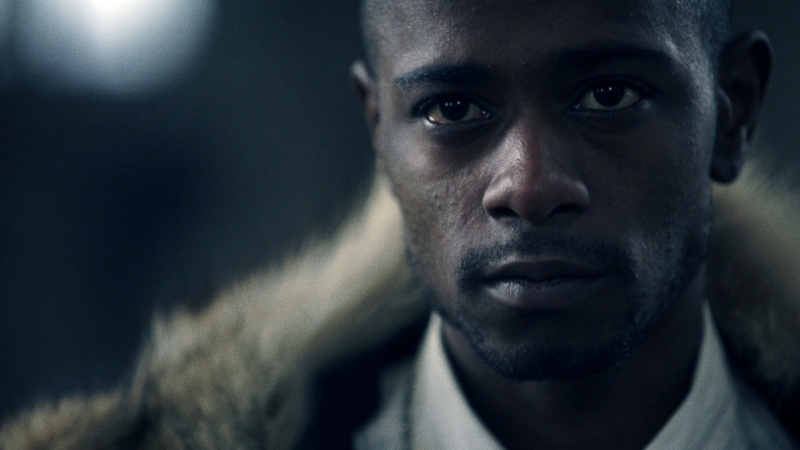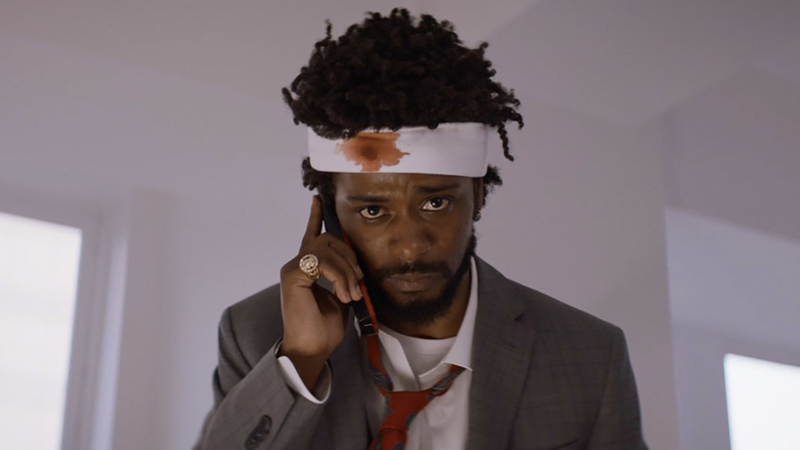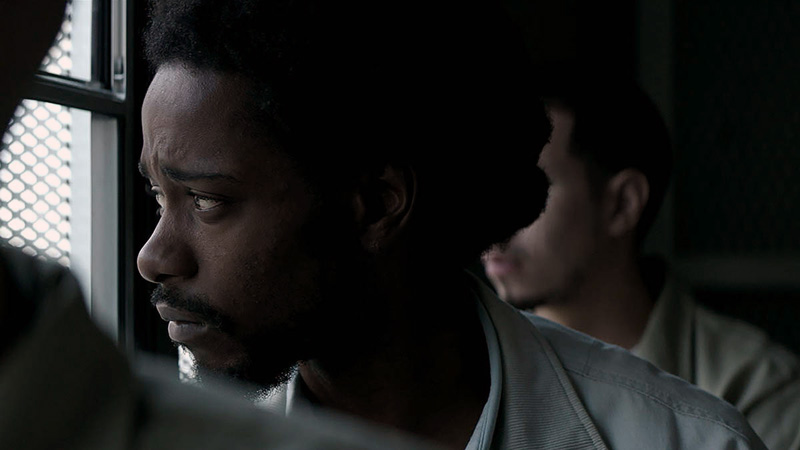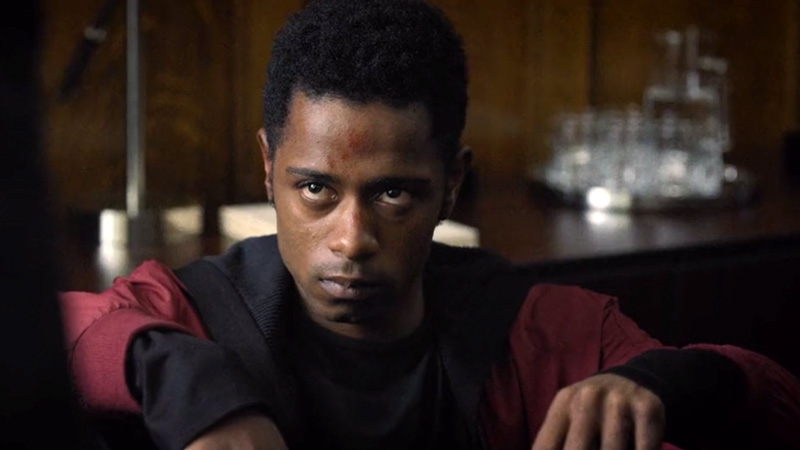by Amy Nicholson | Deadline Hollywood
Lakeith Stanfield is headed home. That is, if he can remember where he lives. “I forgot my street,” he chuckles to the driver. He snaps his fingers once, twice, three times, and like magic, summons his address to mind.
To be fair, he hasn’t been living there long. Since his career started to click, the 27-year-old actor hasn’t been rooted anywhere for long. Yesterday, he was in Boston filming Rian Johnson’s all-star murder mystery Knives Out, alongside Daniel Craig, Michael Shannon, Chris Evans and Jamie Lee Curtis. Then a red-eye flight to Los Angeles, a day of photo shoots, and finally, the back of this car on the way to his new house in the Valley, not far from the crowded apartment he used to share with a bunch of dudes just three years ago when he was still that bit player who would pop up in a movie and make it sparkle, but vanish before audiences remembered to Google his name. Selma, Straight Outta Compton, Short Term 12, Miles Ahead, Dope. Finally, he got two supporting roles that carved him into the public consciousness: as the stoner sage Darius in FX’s Atlanta, and the mind-zapped kidnap victim in Get Out who made a straw boater hat look diabolical. And then, the capper on what feels like an inevitable climb to stardom: the lead in Boots Riley’s Sorry to Bother You, a bizarre and breathtakingly ambitious film that feels like a roadmap to the future of Hollywood, a place where creative talent like his isn’t just a detour, but a destination.
Stanfield adjusts the brim of his pink Captain’s cap and smiles. He owns the same hat in a half-dozen colors—pink, white, red, blue, teal—to match, or clash, with his outfit of the day. “Always sailors, because I like that idea: Riding the waves of life.” He’s ridden them from Base Line Street in the Inland Empire, where he navigated addicts and needles on his way to school, all the way to this one-story wooden house with a backyard stuffed with trees and bushes and rustling critters where he can sit outside and feel “kinda Snow White”.

King Ripple (2015)
The outdoor noises creep out his guests. Maybe his home is haunted, he muses. “There very well could be ghosts because it was built in the ’30s,” says Stanfield. “It was an actor before me. I wonder if he’s still alive, though, or if he’s haunting me through my walls, giving me actor juice.”
Sure, his new neighbors have cluelessly asked if he’s a rapper. “Lemme make these people some cakes or something just to introduce myself and quell all those worries about my tattoos,” Stanfield jokes. “But yeah, I love it. I’m here, I worked hard to get here.”
Sometimes his compass is off. When he first read the script for Sorry to Bother You, Stanfield didn’t like it. “It was a weird, twisted, crazy thing,” he says of Riley’s furious and funny anti-capitalist screed. A telemarketer named Cassius falls through ceilings, adopts a white voice to boost sales, catches the eye of a smarmy techbro (Armie Hammer), becomes the fulcrum of an office strike, gets turned into a meme, and then gets transformed into a half-man, half-horse—all to learn not to sell your soul to corporations. The misadventures of Cassius Green were like Pinocchio on peyote. “It turned me off initially,” Stanfield admits. “Then I picked it up later, and after the second time, I was like, ‘OK, we have to do this.’”

Sorry to Bother You (2018)
His hesitation is surprising because Sorry to Bother You feels like a tailor-made showcase for Stanfield’s specific kind of strange. His Cassius is vulnerable yet manipulative, a straight man in his world and an emotional dervish in ours. He’s a victim and a villain, a money-grubber with a noodle for a backbone, which embarrasses his activist girlfriend Detroit (Tessa Thompson). Clashing with Hammer’s Silicon Valley tycoon Steve Lift, Stanfield would get so riled up that, “when they said cut, I almost forgot we were doing a movie.” In the film’s most uncomfortable scene, Lift pressures him to entertain his fancy party with a rap. Cassius reluctantly grabs the mic—and what comes out is so offensive, we can’t tell if the shocking joke is on him or the crowd.
“You don’t want to feel safe,” Stanfield explains. Not only did Sorry to Bother You take huge risks, its low budget set definitely teetered on the edge of disaster. “It was ghetto fabulous,” he laughs. When Cassius’ desk drops into people’s apartments, Stanfield really fell nine feet, steadying his phone and computer monitor and continuing the scene. On the day his character discovers a monstrous equisapien in an underground bathroom, the stunt man in the homemade horse suit fell to the floor and started flailing as planned. “I’m just like, ‘Oh he’s a good actor,’” says Stanfield. But then he started to smell something burning, and when a plume of smoke streamed out of the horse mask, he realized the internal mechanics were on fire. “They take him out and he’s like, ‘Let’s do it again, let’s go!’ I’m like, ‘Dude, you’re a G, man.’ If I almost burnt to death, I would definitely not just do it again.”
At the film’s Sundance premiere, Stanfield was sanguine. “If it’s a mess, it’s a bleeding mess of authenticity. And if it’s a great piece of artwork,” his voice arching into posh frippery, “then whatever. This is the world’s now and I’m going to let them have it.”

Crown Heights (2017)
The timing was perfect. The current news cycle, notes Stanfield, strikes the same tone as the film. “It’s been kind of like its own horror-tragedy-drama-comedy,” he says. The night of the election, Stanfield was on another plane as the results came in. Passengers sobbed in the aisles. “Although at that moment they were scared, they felt something, they felt engaged,” says Stanfield. “Hopefully this drives us to realize that we’re all stuck in this together, black, white, blue, purple, man, woman or anything else.”
Increasingly, progressive voters seem clued-in to Sorry to Bother You’s impassioned politics. Writer-director Riley, a former community organizer from Oakland, hasn’t held back from linking the ideas in his film to a larger crusade to wrest control back from the 1%.
“Yeah man, let’s burn this b*tch down,” says Stanfield. “I’m optimistic in a sense that I still have hope. I get up every day and I’m like, ‘OK, it’s going to be a nice day. I don’t think everything’s going to self-destruct.’” He pauses. “But I kinda do.”
The numbers are on his side. So far, Sorry to Bother You has made back its budget six times over. That’s fantastic, but what most excites Stanfield is the people who dressed up like Cassius on Halloween—the true sign of a character that connects. He even saw a few photos of folks who’d turned themselves into equisapiens.
“I want people to dress up as me as black Joker, when that inevitably happens,” says Stanfield. He’s not kidding. Earlier generations wanted to play Hamlet. Today’s true artistic coup is landing the part of Batman’s lead villain. “I just think there are so many things that haven’t been touched yet in terms of how the performance can be delivered,” he says, adding, “When I make the movie myself.”

Death Note (2017)
He wants to direct. “All directors are so different, they all have their own approach,” says Stanfield. “They all wear hats.” But really, he wants to do everything, even, “like, a really bad movie, that’s just horrible.” Boom-mics-in-the-shot-horrible, something totally unselfconscious—which, in a way, is its own kind of impossible mission. “Bad transitions, weird stuff going on. Just like an unfolding mess of balls being dropped everywhere,” Stanfield beams. “I’d love to be in one of those.”
Wherever he’s headed next, Sorry to Bother You has put wind in his sails. “The sci-fi world meets black people—I think that’s a beautiful juxtaposition. To be fully realized, interesting characters, not always having to be, ‘Hey man! I just come home from choich!’” he says, adding a rasp to his throat. “Now, we can play a little bit, too.”
But for today, it’s finally time to relax. Stanfield’s car has found its way home. There’s only one problem: he doesn’t have a key. “It’s all good!” he shrugs, making himself comfortable on the porch. “I’ll figure it out!” No doubt he will.
Subscribe to Deadline Breaking News Alerts and keep your inbox happy
